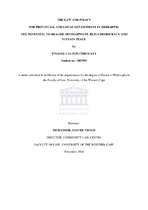| dc.description.abstract | The adoption of the 2013 Constitution of Zimbabwe heralded a new era with high
expectations from ordinary citizens of Zimbabwe. Among other matters, the Constitution provides for a multilevel system of government with government organised at the national, provincial and local levels. The design of this system of government is linked to the need, inter alia, to realise development, build democracy and sustain peace in Zimbabwe. Provincial and local governments are expected to play a role in the realisation of these goals. The question is whether the law and policy governing provincial and local governments in Zimbabwe enables these governments to play that role. It will be argued that the law and policy hinders the role of provincial and local governments in realising development, building democracy and sustaining peace. The national government has excessive supervisory powers over provincial and local governments which limit the minimum level of local discretion required if these lower governments are to assist in realising development, building democracy and sustaining peace. Moreover, the legal and institutional design emphasises coordinative rather than cooperative relations among governments, thereby undermining opportunities for effective multilevel governance. It will be argued that the 2013 Constitution, however, provides the foundation upon which an effective system of multilevel government can be built. Mere alignment of the legislative framework with the 2013 Constitution is nevertheless unlikely to give full effect to the non-centralised system of government envisaged by this new Constitution. What is required is the development of a policy, institutional and legislative framework that gives effect to the constitutional spirit of devolution of power and cooperative governance. | en_US |

